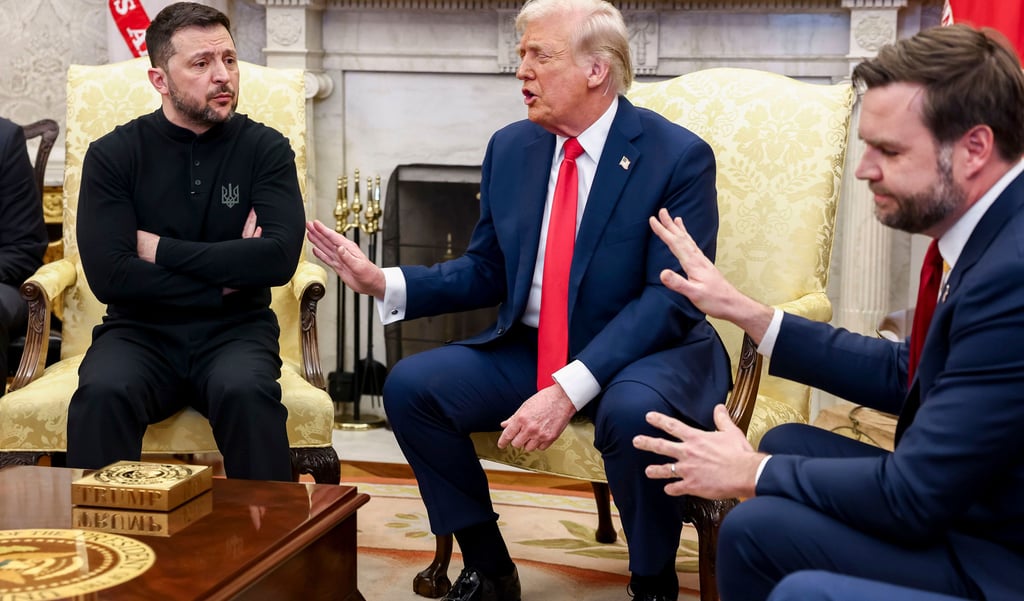Ukraine: Diplomatic Rift with the United States Sparks European Solidarity
As Ukraine continues its war against Russia, divisions are emerging between its Western allies. Has President Volodymyr Zelensky miscalculated his relationship with Washington, or is this a pivotal moment for European leadership in the conflict?
UKRAINEUNITED STATES
Aisulu Sarmanova
3/2/20252 min read


President Zelensky arrived at the White House on 28 February for high-stakes negotiations with Donald Trump, presumably with the aim of securing an agreement on minerals in exchange for security arrangements. However, events took a dramatic turn when Trump and Vice-President JD Vance publicly urged Zelensky to express greater gratitude for the extensive military and financial aid provided by the United States since the war began three years ago.
Zelensky rejected suggestions from key American figures that he should intensify efforts to negotiate a ceasefire with Russian President Vladimir Putin. His stance was perceived by the US administration as dismissive, leading to a tense confrontation. The Ukrainian president was ultimately asked to leave the White House before a planned joint press conference could take place. The minerals deal, which had been widely discussed and seemingly agreed upon earlier in the week, was left unsigned. For Ukraine and its supporters, the episode was a diplomatic debacle, with everything that could have gone wrong unfolding in less than ten minutes.
Despite this setback, Zelensky was met with a markedly different reception in Europe. On 1 March, he arrived in London to a warm welcome, as European leaders sought to reaffirm their commitment to Ukraine in the wake of the Oval Office confrontation. British Prime Minister Keir Starmer personally greeted him at the door of Downing Street, expressing the United Kingdom’s unwavering support. Meanwhile, other European officials voiced their discontent with what they perceived as the Trump administration’s increasingly conciliatory stance towards Russia and its apparent distancing from Ukraine.
French President Emmanuel Macron was particularly forthright, drawing a stark distinction between Russia as the “aggressor” and Ukraine as the “victim.” He reiterated that France, along with other European nations, remained committed to sanctioning Russia and sustaining support for Ukraine, even three years after the initial invasion in February 2022.
The widening rift between Zelensky and the Trump administration carries both economic and strategic implications for businesses worldwide. The minerals deal, while currently unratified, still represents an opportunity for industries involved in energy production, infrastructure development, and resource extraction. Given the increasing global demand for critical minerals such as nickel, cobalt, and lithium, companies in the United States and Europe may explore joint ventures or direct investments in Ukraine’s resource-rich regions. For firms specialising in green technology and electric vehicles, this could provide a significant strategic advantage, positioning Ukraine as a key supplier in the sector.
On a broader scale, American military contractors may find new business opportunities if tensions with Russia escalate. Companies involved in the production of military hardware, cybersecurity, and drone technology could see increased demand from NATO allies as well as Ukraine. Similarly, with European leaders reaffirming their commitment to Kyiv, European firms may expand their involvement in post-war reconstruction efforts, particularly in renewable energy and infrastructure rehabilitation.
Beyond military and industrial sectors, humanitarian organisations and foreign aid agencies may find new avenues to contribute to Ukraine’s rebuilding efforts. Logistics firms and technology providers could play a crucial role in reconstruction projects, supporting Ukraine’s recovery while navigating the complex geopolitical landscape.
The diplomatic confrontation between Zelensky and the Trump administration has triggered significant political and economic consequences. While European nations appear to be strengthening their commitment to Ukraine, growing tensions between the United States and its traditional allies may reshape global alliances. In an increasingly uncertain geopolitical climate, businesses capable of adapting to these shifting dynamics will face both challenges and opportunities as Ukraine continues its fight for sovereignty.


